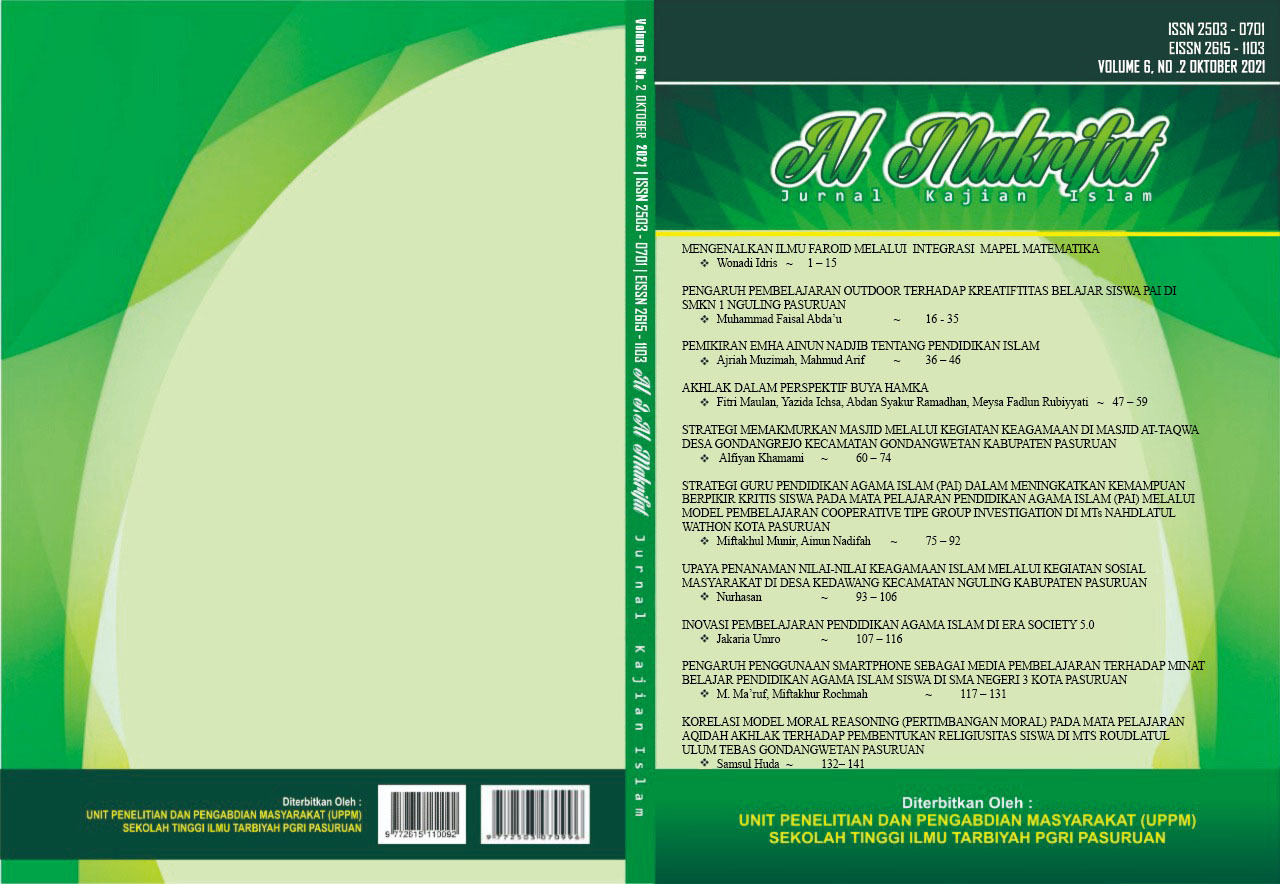Strategi Guru Pendidikan Agama Islam (PAI) Dalam Meningkatkan Kemampuan Berpikir Kritis Siswa Pada Mata Pelajaran Pendidikan Agama Islam (PAI) Melalui Model Pembelajaran Cooperative Tipe Group Investigation di MTS Nahdlatul Wathon Kota Pasuruan
Abstract
This research is motivated by the teacher's strategy that affects students' critical thinking skills. Teacher professionalism is not only measured by how well the teacher understands the subject matter being taught. But also on how teachers can manage the class well. Because during the learning process in the classroom students do not escape thinking activities. The thought process also has its own saturation point at every age level. Therefore, if the teacher is able to manage the class well, then the boredom and boredom that is often experienced by students in general can be overcome. The purpose of this study was to determine the strategy of Islamic Religious Education teachers in improving students' critical thinking skills in Islamic Religious Education subjects through a cooperative learning model of group investigation type in class VIII-B MTs Nahdlatul Wathon Pasuruan City, and to find out supporting factors and inhibiting factors in improving students' critical thinking skills in Islamic Religious Education subjects through cooperative learning model type group investigation in class VIII-B MTs Nahdlatul Wathon Pasuruan City. This study uses a qualitative method using field research (field research). Qualitative research methods are research methods used to research in natural conditions (natural settings), where qualitative methods are used to obtain in-depth and actual data. While the approach used is a descriptive analysis approach, namely analyzing data by presenting a description of the situation under study in the form of a narrative description. Based on the research shows that the strategy adopted by teachers using cooperative learning model type group investigation, the results obtained are: encouraging students to improve critical thinking skills, changing students to be active in learning, especially in learning Islamic Religious Education, developing student independence in solve problems and be able to build a high social spirit for students in working together between groups. Keywords: Islamic Religious Education Teacher Strategy, Critical Thinking, Cooperative Learning Model Type Group InvestigationReferences
Daradjat, Zakiyah. 1998. Kompetensi Guru Pendidikan Agama Islam. Jakarta: Rajawali Pers
Helmawati. 2017 Pendidikan Karakter Sehari-hari. Bandung: PT Remaja Rosdakarya
Huda, Miftahul. 2013. Cooperative Learning, Metode, Teknik, Struktur dan Model Penerapan. Yogyakarta: Pustaka Pelajar
Kunandar. 2011. Langkah Mudah Penelitian Tindakan Kelas Sebagai Pengembangan Profesi Guru. Jakarta: Raja Grafindo Persada
Langgulung, Hasan. 2002. Peralihan Paradigma Dalam Pendidikan Islam dan Sains Sosial. Jakarta: Gaya Media Pratama
Mulyasa, E. 2013. Standar Kompetensi dan Sertifikasi Guru. Bandung: PT Remaja Rosdakarya
Mulyasa. 2007. Menjadi Guru Profesional Menciptakan Pembelajaran Kreatif dan Menyenangkan. Bandung: PT. Remaja Rosdakarya
Sugiyono. 2010. Metode Penelitian Pendidikan: Pendekatan Kuantitatif, Kualitatif dan R&D. Bandung: Alfabeta
Suwarno, Wiji. 2006. Dasar-Dasar Ilmu Pendidikan. Yogyakarta: Ar-Ruzz Media
Tafsir, Ahmad. 2011. Ilmu Pendidikan Dalam Perspektif Islam. Bandung: PT. Remaja Rosdakarya




